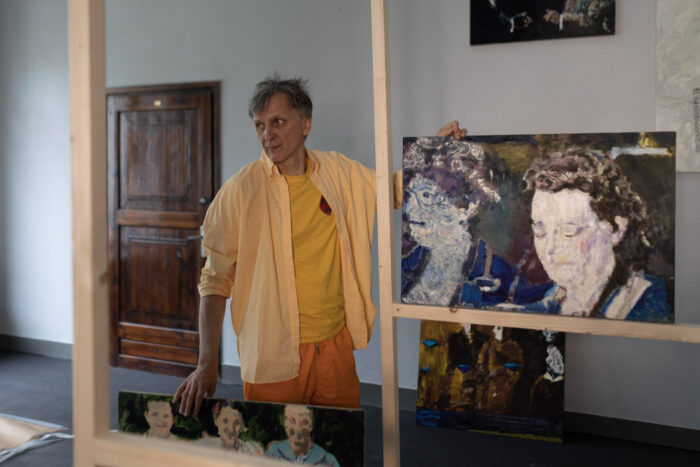
Photo: Jacek Twardowski
Thanks to events like the Otwock anniversary commemorations or this exhibition, Polish Jews stop just being a mention in a textbook, a long forgotten, extinct history. Memories come alive and with them the memory of people and events who make up our common, Polish-Jewish heritage.
Text by Zygmunt Stępiński, director of POLIN Museum of the History of Polish Jews, published in the catalogue of the Life, After All. Exhibition of paintings by Wojciech Cieśniewski.
‘To preserve and recall the memory of the history of Polish Jews and to counteract antisemitism, discrimination, and exclusion by fostering mutual understanding and respect.’ This is the mission of POLIN Museum of the History of Polish Jews. The museum stands in what was once the heart of Jewish Warsaw, an area which the Germans turned into a ghetto during World War II. Our modern building faces the Monument to the Ghetto Heroes, thus creating a unique space for remembrance and reflection. The Monument pays tribute to the struggle and suffering of Polish Jews, while the POLIN Museum recalls their history, showing also that the Holocaust — contrary to the criminal intentions of its organisers — did not mark the end of Jewish life and culture in Poland.
The institution I’m honoured to lead has had millions of visitors over the scant nine years of its existence. As well as the core exhibition, which tells the story of the thousand years that Jews have lived in Polish lands, the museum has put on a succession of temporary exhibitions about the culture and history of Polish Jews, organised thousands of educational workshops, and cultural or academic events.
POLIN Museum has been realising its mission for many years, but that is still not enough. To be able to say, ‘There is no history of Poland without the history of Polish Jews,’ needs the brave, the wise and the exceptional people who, often without any resources, sometimes against the odds, rekindle the memory of the Jews who lived in their localities.
One of these grassroots initiatives is the Citizens’ Committee for Remembrance of the Jews of Otwock and Karczew, headed for twenty years by Zbigniew Nosowski, editor-in-chief of the Catholic intellectual quarterly Więź. The March of Remembrance and Prayer he has organised every 19 August since 2002, on the anniversary of the annihilation of the Otwock ghetto, is a significant event that also attracts people from all over Poland and from abroad. The members of the Committee are invested in bringing back the memory of the Jewish community of the town and surrounding area, organising educational meetings in schools, exhibitions, concerts, guided walks and other events.
As an expression of great appreciation for this work, POLIN Museum presented Zbigniew Nosowski with the POLIN Special Award 2021. The POLIN Awards competition has been organised since 2015 to honour individuals or organisations working to preserve the memory of Polish Jews, and who contribute to the creation of a common future, and mutual understanding and respect between Polish and Jewish people. In addition Więź was acknowledged for its achievements in growing Polish-Jewish relations, and its editor-in-chief for his engagement in the Polish Council of Christians and Jews.
I find it very moving that this year POLIN Museum can support the Citizens’ Committee for Remembrance of the Jews of Otwock and Karczew in commemorating the 80th anniversary of the annihilation of the Otwock, Falenica and Rembertów ghettos. At the invitation of the organisers, initiators and the artist himself, we decided to collaborate in the creation of the Life, After All exhibition. This is an exceptional exhibition of paintings by Professor Wojciech Cieśniewski, who on his canvases recalls the faces of Otwock’s former residents. He does not just tell the stories of their deaths, but equally wants to talk about their lives.
It is precisely because of exceptional events like the Otwock anniversaries and this exhibition that Polish Jews stop just being a mention in a textbook, a long forgotten, extinct history. Memories come alive and with them the memory of people and events who make up our common, Polish-Jewish heritage.
Translated by Jolanta Scicińska
Zygmunt Stępiński: historian, journalist, publisher and museum curator. In the 1980s part of the democratic opposition. Joint founder and chairman of Murator [builders’ and D-I-Y monthly]. From 2012 deputy director of POLIN Museum. From February 2019 acting director, and from 1 March 2020 the director of POLIN Museum of the History of Polish Jews.